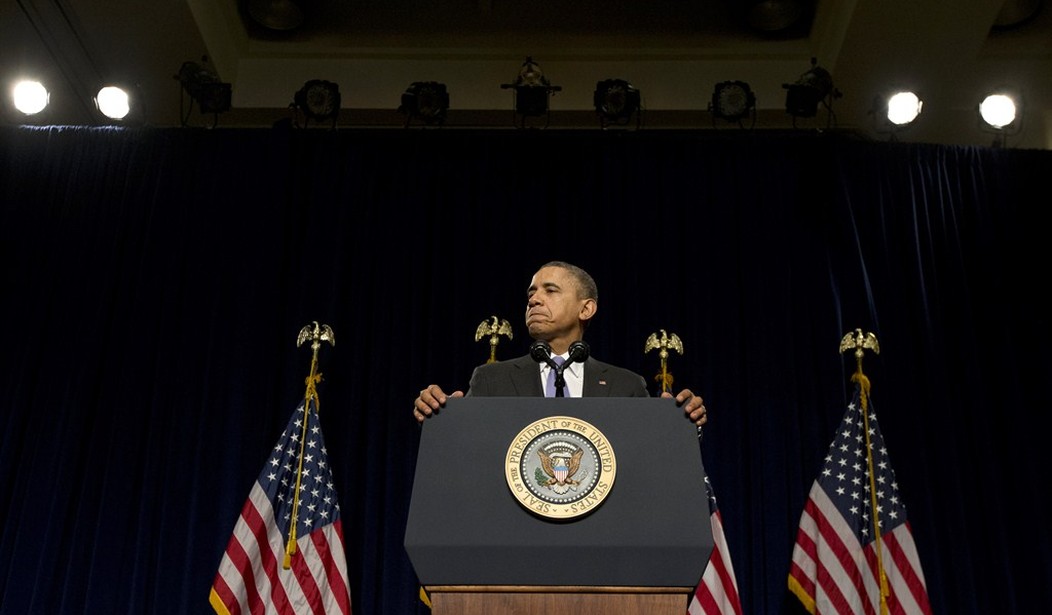After delaying the employer mandate to provide Obamacare health insurance to all full time employees for a year, the administration has delayed the mandate for medium size business for a second year. It has also relaxed the mandate for large businesses (they only have to cover 70% of their workers the next year).
All of this is lawlessness of course. The statute clearly says that the mandate is supposed to kick in this year. So why is President Obama taking the extra-constitutional step of letting employers temporarily off the hook?
The reason is not hard to understand. Millions of workers are in danger of losing their jobs or their other fringe benefits (such as matches to a retirement savings plan) or being forced to work part-time. Many of them are employees of hotels, restaurants and large retail stores. And these workers just might take out their anger on Democratic candidates in next fall's election.
Take a low-wage worker earning, say, $10 an hour and working 30 hours a week. This worker's annual income is a little more than $15,000 a year. But the average cost of employer-provided coverage in the United States is more than that.
That's right. Health insurance for a family costs more than this worker's entire annual income!
Here is what the new health reform law does.
First, it requires the employer to provide a rich package of benefits or pay a hefty fine. Employers must pay $2,000 per employee per year to Uncle Sam if they fail to offer affordable insurance to their full-time employees. The fine climbs to $3,000 if the employer offers the wrong kind of insurance and the employee seeks subsidized insurance in a health insurance exchange.
Recommended
Second, the law requires employers to offer the same kind of insurance on the same terms to low-wage employees as it offers to high-wage employees — although this provision has also been temporarily delayed. Employers don't have to pay any of the premiums for the employees' dependents. But if the employer is paying most of the premium for the dependents of highly compensated employees the company must do the same for low-wage employees.
Third, the law provides no financial help to the typical business to make the mandates affordable. Say a low-wage employee is not offered health insurance by his employers. Then he can get almost fully subsidized insurance in a health insurance exchange. But there is no new subsidy for those forced to get insurance at work.
Economics teaches that fringe benefits (like health insurance) are not gifts from employers. They are substitutes for money wages. And the sum total of a worker's compensation tends to equal the value of what the worker produces. Employees don't suddenly become more productive just because government mandates a benefit that doubles the worker's compensation. Something has to give. For millions of employees, what may give is their job. At least a full-time job.
For the moment, many employers of low-wage workers are providing "mini-med" insurance. These plans typically provide $1,000 or $2,000 worth of coverage and in some cases as much as $25,000 — but nowhere near the full coverage with no annual or lifetime limits required under Obamacare. Here is the interesting twist, however: the mini-med plans many of these workers have may be more attractive to them than Obamacare insurance.
The reason is that the mini-med plans pay upfront medical costs, with little more than a token co-payment from the patient. Obamacare, by contrast, allows thousands of dollars in deductibles and co-payments. As I wrote at my blog:
Health insurance is a way of protecting one's financial resources against the expense of a catastrophic illness.
But if you don't own a house, you have no need for homeowners insurance. If you don't own a car, you have no need for auto casualty insurance. Similarly, if you have no assets at all (other than your human capital) why would you want health insurance?
For low and moderate income households, the reason why mini med plans are attractive seems to be this: People living paycheck to paycheck have trouble maintaining a reserve for unexpected medical expenses. So as an alternative to personal savings and higher wages, they appear to be willing to take less in take home pay in return for a modest amount of health insurance.
All that is rational. What is irrational is to use almost all of your paycheck to buy a health insurance plan with an unlimited benefit ? one that, say, is able to pay a $1 million medical bill. Why would you buy a million dollars' worth of coverage if you don't have a million dollars of assets to protect?
As I have written previously, there are things employers can do to minimize the burdens of Obamacare. But minimizing burdens is not the same thing as making them go away.
So the White House is understandably worried. One wonders why it took them so long.

























Join the conversation as a VIP Member